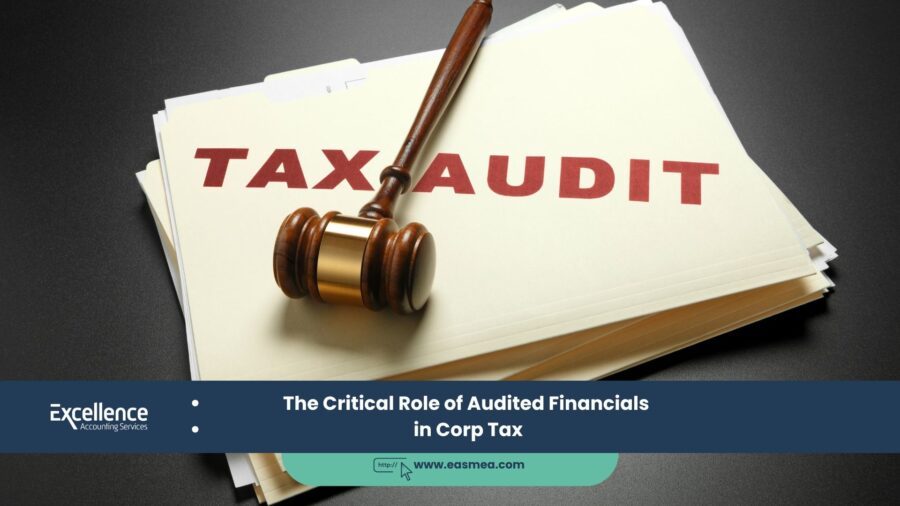The Critical Role of Audited Financials in Corp Tax
With the dawn of the Corporate Tax (CT) era in the UAE, the standards of financial governance have been permanently elevated. No longer is financial reporting just an internal management tool or a requirement for securing a loan; it is now the bedrock of a business’s relationship with the Federal Tax Authority (FTA). At the heart of this new paradigm lies a single, indispensable element: the audited financial statement. It is the ultimate source of truth, providing a verified, independent, and credible basis for calculating a company’s tax liability.
- The Critical Role of Audited Financials in Corp Tax
- Part 1: Defining the Gold Standard - What Are Audited Financials?
- Part 2: The Legal Imperative for Audited Financials in the UAE
- Part 3: Why Audited Financials are Non-Negotiable for Tax Compliance
- Part 4: The Path to Audit-Readiness
- What Excellence Accounting Services (EAS) Can Offer
- Frequently Asked Questions (FAQs)
- Build a Defensible Tax Position with a Professional Audit.
Many businesses may view the annual audit as a costly compliance burden. However, in the context of Corporate Tax, this perspective is dangerously shortsighted. An audit is not a mere checkbox; it is a critical strategic process that validates the very numbers upon which your tax return is built. It provides an essential layer of assurance, demonstrating to the FTA that your financial records are accurate, complete, and compliant with internationally accepted standards. This guide will illuminate the crucial and non-negotiable role of audited financials in the UAE’s Corporate Tax regime, exploring the legal requirements, the profound benefits for tax compliance, and how a proactive approach to auditing can safeguard your business against risks and disputes.
Key Takeaways on Audited Financials and Corporate Tax
- The Foundation of Your Tax Return: The audited accounting net profit is the starting point for calculating taxable income. Without it, your calculation lacks credibility.
- A Legal and Regulatory Mandate: For many companies in the UAE, maintaining audited financials is a pre-existing requirement under the Commercial Companies Law, now reinforced by the Corporate Tax Law.
- Defense Against Scrutiny: Audited statements provide the ultimate proof to the FTA, substantiating your revenue, expenses, and transfer pricing policies.
- Essential for Tax Reliefs: Claiming tax reliefs, carrying forward losses, and forming a Tax Group are all dependent on having reliable, audited financial records.
- More Than Compliance: An audit provides invaluable insights into financial controls and operational efficiencies, making it a powerful business improvement tool.
Part 1: Defining the Gold Standard – What Are Audited Financials?
Before diving into their role in tax, it’s crucial to understand what audited financial statements are and what the process entails. They are far more than just a set of spreadsheets; they are a formal report that has undergone rigorous, independent scrutiny.
The Audit Process Explained
An audit is an independent examination of a company’s financial statements conducted by a licensed, external auditor. The auditor’s job is to form an objective opinion on whether the statements:
- Are free from “material misstatement,” whether due to fraud or error.
- Present a “true and fair view” of the company’s financial position and performance.
- Are prepared, in all material respects, in accordance with an applicable financial reporting framework (such as IFRS).
This process involves testing transactions, verifying balances, reviewing internal controls, and gathering sufficient evidence to support their final opinion. A professional external audit provides the highest level of assurance to stakeholders, including the FTA.
The Key Components
A complete set of audited financial statements includes:
- The Independent Auditor’s Report: This is the cover letter that contains the auditor’s final opinion.
- Statement of Financial Position (Balance Sheet): A snapshot of the company’s assets, liabilities, and equity at a specific point in time.
- Statement of Profit or Loss and Other Comprehensive Income (Income Statement): Summarizes revenues, costs, and expenses over a period.
- Statement of Cash Flows: Shows how cash moved in and out of the company from operating, investing, and financing activities.
- Statement of Changes in Equity: Details the movement in owners’ equity over the period.
- Notes to the Financial Statements: Provides detailed explanations of the accounting policies used and breakdowns of the numbers in the main statements.
Part 2: The Legal Imperative for Audited Financials in the UAE
The requirement for audited financials is not new. It has been a long-standing pillar of the UAE’s regulatory framework, which has now gained even greater significance with the introduction of Corporate Tax.
UAE Commercial Companies Law
For decades, the UAE Commercial Companies Law has mandated that certain types of entities, particularly Limited Liability Companies (LLCs) and Joint Stock Companies, must appoint an independent auditor and have their annual accounts audited. This requirement was established to protect shareholders, creditors, and other stakeholders by ensuring transparency and accountability.
The Corporate Tax Law Reinforcement
The UAE Corporate Tax Law (Federal Decree-Law No. 47 of 2022) does not explicitly state that every single taxpayer must submit audited financials. However, it mandates that all taxpayers must prepare and maintain financial statements on an accrual basis and in accordance with IFRS. Furthermore, Cabinet Decision No. 10 of 2023 specifies that Free Zone businesses wishing to benefit from the 0% rate (Qualifying Free Zone Persons) MUST have their financial statements audited. For mainland businesses, the FTA has the explicit right to request audited financials to support a tax return. In practice, filing a tax return for any significant business without an underlying audit is a high-risk strategy that invites scrutiny.
Part 3: Why Audited Financials are Non-Negotiable for Tax Compliance
Submitting a tax return based on unaudited, internal management accounts is like building a house on a foundation of sand. An audit provides the concrete base needed for a robust and defensible tax position.
1. The Verified Starting Point for Taxable Income
The Corporate Tax journey begins with the accounting net profit (or loss) as reported in your financial statements. This figure is then adjusted for specific tax purposes (e.g., adding back non-deductible expenses) to arrive at the “Taxable Income.” If the starting net profit figure is not verified by an auditor, the entire calculation is questionable. Audited financials provide a credible, IFRS-compliant starting point that the FTA can rely on.
2. Substantiating Every Deduction
One of an auditor’s key roles is to test the validity of expenses. They verify that expenses were actually incurred and are supported by proper documentation (invoices, contracts, etc.). This independent verification provides powerful support for your claim that these expenses were incurred “wholly and exclusively” for business purposes, a cornerstone of deductibility. This is impossible to prove with simple management accounts. Rigorous accounting and bookkeeping throughout the year is the foundation of a smooth audit.
3. Defending Your Transfer Pricing Policies
For businesses with transactions between related parties, transfer pricing is a major focus for the FTA. Audited financials, including detailed notes on related party transactions, are essential for demonstrating that these dealings were conducted at “arm’s length.” An auditor will review these transactions, providing an independent check on the fairness of the pricing, which is crucial for your transfer pricing documentation.
4. Building Credibility and Reducing Audit Risk
Proactively submitting audited financial statements sends a strong signal to the FTA that your business is committed to transparency and good governance. It demonstrates that a third-party expert has already scrutinized your figures. This inherent credibility can significantly reduce the probability of your business being selected for a time-consuming and costly tax audit. It’s a proactive measure of risk management, often guided by strategic CFO services.
Part 4: The Path to Audit-Readiness
Achieving a clean audit report doesn’t happen by accident. It is the result of disciplined financial management throughout the year, powered by the right technology and processes.
The Role of a Modern Accounting System
Maintaining audit-ready records in real-time is nearly impossible without a capable accounting platform. Solutions like Zoho Books are built for the UAE’s regulatory environment. They allow you to maintain a clear audit trail for every transaction, manage documentation digitally, and produce accurate financial reports that serve as the primary source for your auditors. A professional accounting system implementation ensures your system is configured for compliance from the start.
What Excellence Accounting Services (EAS) Can Offer
At EAS, we understand that a successful audit is the culmination of a year’s worth of financial diligence. We provide end-to-end services to ensure your business is not just compliant, but strategically positioned for financial health and tax efficiency.
- FTA-Approved Auditing Services: Our team of licensed auditors provides independent, high-quality external audit services that meet all regulatory requirements for Corporate Tax.
- Audit-Ready Bookkeeping: We provide meticulous accounting and bookkeeping services throughout the year to ensure your records are always accurate and prepared for audit.
- Internal Audit and Controls: Our internal audit services help you identify and rectify weaknesses in your financial controls before the external auditors arrive, ensuring a smoother process.
- Strategic Corporate Tax Advisory: We integrate your audit and compliance strategy with your broader business goals, providing expert advice on all aspects of UAE Corporate Tax.
- Accurate Financial Reporting: We help you prepare clear, IFRS-compliant financial reports that provide a solid foundation for both your audit and your tax return.
Frequently Asked Questions (FAQs)
While the law mandates audited financials for Qualifying Free Zone Persons, the requirement for mainland companies is less direct but practically essential. The FTA can request audited financials from any taxpayer. Filing without them, especially for a large or complex business, is a significant red flag and a major compliance risk.
An internal audit is conducted by or for the company’s management to review internal controls and operational efficiency. It’s a management tool. An external audit is conducted by an independent, licensed auditor for the benefit of external stakeholders (like the FTA and shareholders) to provide an opinion on the fairness and accuracy of the financial statements.
Legally, yes. However, you are taking a significant risk. Without the independent verification of an audit, your figures are merely assertions. If the FTA decides to review your return, you will have a much harder time defending your position, potentially leading to adjustments, penalties, and interest.
An “unqualified” or “clean” opinion is the best possible outcome. It means the auditor has concluded that the financial statements are presented fairly, in all material respects. A “qualified” opinion, on the other hand, indicates a specific area of departure from accounting standards or a limitation in the scope of the audit. For the FTA, an unqualified opinion provides the highest level of assurance.
Yes. The Corporate Tax Law specifies that taxpayers must prepare financial statements in accordance with International Financial Reporting Standards (IFRS) as accepted in the UAE.
An audit is crucial for loss-making companies. It provides a verified figure for the tax loss that can be carried forward to offset future profits. The FTA will only allow the utilization of tax losses that are properly substantiated, and an audit is the best way to do this.
A history of clean, audited financial statements is essential for any business valuation or due diligence process. It provides potential buyers or investors with confidence in the financial health and historical performance of the company, leading to a smoother transaction and potentially a higher valuation.
While the FTA generally relies on statements audited by a licensed UAE auditor, they retain the right to make their own assessments. If they find evidence of negligence, fraud, or significant error during a tax audit, they can challenge the figures and make adjustments to your taxable income, regardless of the audit opinion.
Even for small businesses, an audit is highly recommended. It establishes good governance from the start, makes it easier to secure financing, and prepares you for growth. From a tax perspective, it ensures your records are in order and reduces the risk of future disputes with the FTA as you grow.
The Corporate Tax Law requires taxpayers to maintain all relevant records, including audited financial statements and supporting documents, for a minimum period of seven years following the end of the relevant tax period.
Conclusion: The Ultimate Strategic Asset in the Tax Era
In the new landscape of UAE Corporate Tax, audited financial statements have been elevated from a best-practice recommendation to an essential pillar of compliance and risk management. They are the definitive language of business that the FTA understands and trusts. Viewing the annual audit not as a cost, but as a strategic investment in credibility, transparency, and defensibility is the hallmark of a forward-thinking business. By embracing a culture of financial discipline and independent verification, companies can navigate the complexities of Corporate Tax with confidence and build a resilient foundation for long-term success.




